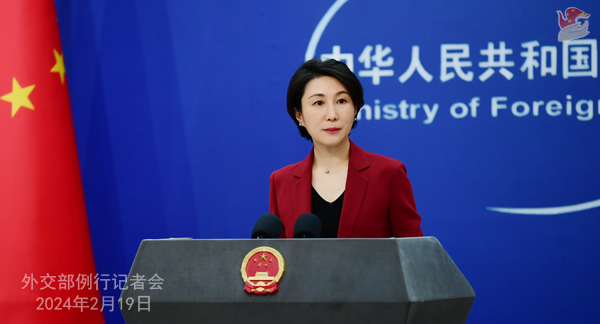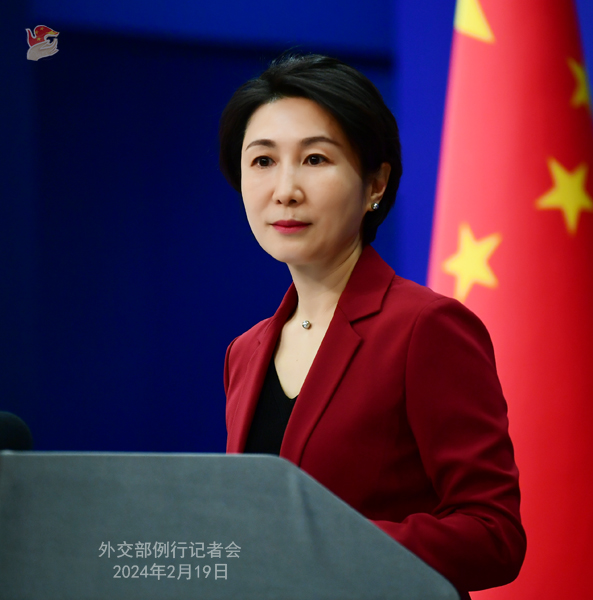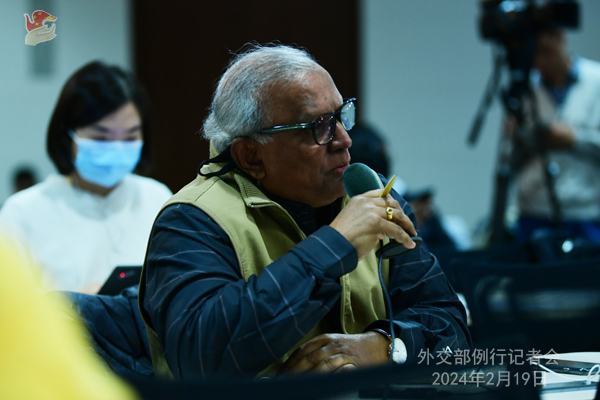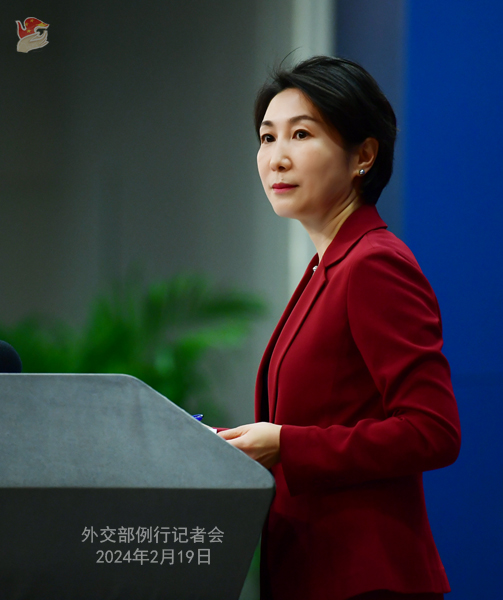
CCTV: We noticed that the just concluded 60th Munich Security Conference offered reflections on the current international order that led to “lose-lose” dynamics. Foreign Minister Wang Yi was at the conference. What message did China mainly send? How do you view the “lose-lose” dynamics?
Mao Ning: Member of the Political Bureau of the CPC Central Committee and Minister of Foreign Affairs Wang Yi attended the 60th Munich Security Conference and delivered a keynote speech at the “Conversation China in the World.” In his speech, the core message is that China will keep its major principles and policies consistent and stable and serve as a force for stability in a turbulent world.
First, China will be a force for stability in promoting cooperation between major countries. For major countries, the more volatile the international landscape, the greater the need to enhance coordination; the more acute the risks and challenges, the greater the need to advance cooperation. We stand ready to advance coordination and cooperation between major countries, work with the US to implement the common understandings reached by the two heads of state, promote the steady growth of China-Russia relations and uphold our partnership with Europe to jointly inject positive energy into a volatile world.
Second, China will be a force for stability in addressing hotspot issues. We will actively implement the Global Security Initiative and explore a Chinese way of addressing hotspot issues, one that advocates for non-interference in internal affairs and opposes imposing one’s will on others; upholds impartiality and justice and opposes pursuing selfish interests; seeks political settlement and opposes using force; aims to address both the symptoms and the root causes and opposes myopia and one-sidedness.
Third, China will be a force for stability in enhancing global governance. We will firmly uphold the authority and central role of the United Nations and support the Security Council in playing a primary role on peace and security. We will enhance solidarity and cooperation of the Global South, respect the sovereignty and territorial integrity of all countries, provide more public goods to the world, and contribute our share to meeting global challenges.
Fourth, China will be a force for stability in promoting global growth. The Chinese economy, as vibrant and resilient as ever, is showing a more robust momentum of long-term growth. Last year, it grew by 5.2 percent, accounting for one third of global growth. We will focus energy on realizing Chinese modernization, seek faster progress in high-quality development, expand institutional opening up and bring more dividends to the rest of the world.
Mutually beneficial cooperation should be the basic principle of all countries’ policy in handling international relations. We stand ready to work with all parties together like passengers in the same boat, seek win-win and avoid lose-lose to bring more certainty to the world and usher in a brighter future for humanity.
China News Service: Pakistan held general elections for its National Assembly and provincial assemblies on February 8. The elections have produced preliminary results and relevant parties are working on forming a cabinet. What is China’s comment on this? What is China’s expectation for the development of China-Pakistan relations going forward?
Mao Ning: China noted that general elections in Pakistan are held in a generally steady and smooth manner and we offer our congratulations on this. As a close and friendly neighbor, China fully respects the choice of the Pakistani people and sincerely hopes that relevant parties of Pakistan will work together to uphold political solidarity and social stability after the elections and jointly open up a brighter future for the development of the country.
China and Pakistan are all-weather strategic cooperative partners. China hopes to work with Pakistan to build on the traditional friendship, deepen practical cooperation in various areas, and accelerate the building of an even closer China-Pakistan community with a shared future in the new era for the benefit of the peoples of the two countries.
Anadolu Agency: Despite international warnings from the UN and countries around the world, including China, Israel continued its attacks last week in the city of Rafah in southern Gaza. Tel Aviv government stated that it will pursue a broad military operation there. Now, nearly 1.5 million Palestinians, which is the most of the population of Gaza’s 2.3 million population are now stuck in Rafah. Most of them are displaced from the north because Israel deemed the place as a safe area. But they are now in danger of being stuck in a military attack and military operation. UN agencies warn that a military operation in Rafah will deepen the ongoing humanitarian crisis, including a serious famine in the area. What is China’s position concerning the recent developments in Rafah?
Mao Ning: China is closely watching the developments in Rafah. We oppose and condemn acts against civilians and international law. We call on Israel to stop military operations as soon as possible, do everything possible to avoid casualties among innocent civilians and prevent a more devastating humanitarian disaster in Rafah.

Antara: China’s Ambassador to Indonesia, Lu Kang, pays a recent visit to presidential candidate number two Prabowo Subianto to congratulate Prabowo. How the Ministry see Prabowo Subianto as the new leader of Indonesia, particularly for the two countries’ relations?
Mao Ning: Indonesia is our friendly neighbor. We congratulate Indonesia on the smooth and successful presidential election and believe that the choice of the Indonesian people is in the interest of their country’s future and prosperity. China looks to continue to work with Indonesia to stick to the main theme of building a community with a shared future, forge high-level strategic mutual trust, deepen strategic cooperation across the board, and advance the sustained, sound and steady growth of China-Indonesia relations to deliver greater benefits for our two peoples.
Reuters: Some of Germany’s biggest companies like Volkswagen and BASF are rethinking or divesting their business interests in Xinjiang due to concerns over forced labour in Xinjiang. What else can China do to ease such concerns? Will Xinjiang sort of end up “decoupling” from the West?
Mao Ning: As Foreign Minister Wang Yi noted at the Munich Security Conference, some political forces have spread too many rumors and created too much disinformation about Xinjiang in the world. “Forced labor” is one of these. By concocting these lies, they are aiming to destabilize Xinjiang and hold back China’s development and revitalization. What they are actually doing is to force “de-coupling”, unemployment and poverty on Xinjiang under the pretext of human rights. Such attempts will never succeed. Currently Xinjiang enjoys social stability, economic growth, ethnic solidarity and harmony among various religions. The rights and interests of the people of all ethnic groups in Xinjiang are well protected. We hope relevant companies will respect facts, tell right from wrong, and cherish the opportunity to invest and grow in Xinjiang.
Anadolu Agency: Israel’s Prime Minister Benjamin Netanyahu said they won’t accept an international mandate for a permanent solution to the Palestinian issue and his cabinet adopted a “declaratory decision” to reject any recognition of Palestinian statehood by the UN or other countries. They seem to reject any international involvement or any guarantee from international community for a permanent solution in Palestine. China frequently points to the need to hold an international peace conference to find a solution for the matter. Do you think Israel’s approach can solve the question and bring peace to the region?
Mao Ning: The two-State solution is the universal consensus of the international community to settle the Palestinian question. Implementing the two-State solution is the only way to end the cycle of conflict between Palestine and Israel. China stands ready to work with all parties to hold a more broad-based, authoritative and effective international peace conference as early as possible, formulate a concrete timetable and roadmap for the implementation of the two-State solution and support Palestine and Israel in resuming peace talks soon for the ultimate peaceful coexistence between the two states of Palestine and Israel.
Phoenix TV: We noted that the European Commission announced an anti-subsidy investigation into a subsidiary of CRRC on February 16. What is China’s comment on this?
Mao Ning: For specific economic and trade issues, I’d refer you to competent Chinese authorities. I would like to say more broadly that China is concerned over the European Commission’s announcement to launch an investigation into CRRC Qingdao Sifang Locomotive over the so-called subsidy issue. We hope the EU will use the tool of the Foreign Subsidies Regulation prudently, handle specific economic and trade issues through dialogue and consultation, and provide a fair, just and non-discriminatory environment for Chinese companies.

The Paper: We noted that the recent Spring Festival of the Year of the Dragon witnessed explosive growth in cultural and tourism consumption, especially the booming inbound and outbound travel. Chinese tourists traveled to as many as 125 countries in the world. What’s your comment?
Mao Ning: As China implements a visa-free policy for a larger circle of friends, the country sees its inbound and outbound travels soar, with more Chinese tourists going abroad and more foreign travelers visiting China. The Spring Festival became the peak time of global tourism. The World Tourism Organization (UNWTO) reported that the recovery of Chinese outbound and inbound tourism is expected to accelerate in 2024, turbocharging the recovery of the global tourism market.
The Spring Festival of the Year of the Dragon offers the world a window on China’s economic vibrancy, which has boosted market expectations and confidence and augurs well for 2024. During the Spring Festival holiday, China’s domestic tourism spending hit RMB 632.6 billion, up by 7.7 percent from the same holiday period in 2019. China’s box office revenue during the festival totaled RMB 8 billion, marking a new record high. The booming outbound travel also brought dividends of the holiday consumption and auspiciousness and joy of the Lunar New Year to the world.
As the Spring Festival heralds an upward momentum of growth, China will continue to facilitate cross-border travel, promote high-level opening up and create more favorable conditions for countries to share in opportunities brought by China.
Anadolu Agency: Today, the International Court of Justice will open hearings about Israel’s historical occupation of Palestinian territories. The UN top court will hear about Israel’s denial of Palestinians’ right to self-determination and its discrimination against the population to form a legal opinion about it. What is China’s position about these proceedings?
Mao Ning: On the advisory opinion by the International Court of Justice, China submitted its written statement on July 25 last year and will take part in the public hearings of the ICJ to have an in-depth elaboration on China’s policy propositions on the question of Palestine, state China’s positions on relevant international law issues regarding the right to self-determination, international humanitarian law, international human rights law and State responsibility, and express China’s firm support for the just cause of the Palestinian people to restore their legitimate national rights and interests. China stands ready to work with the rest of the international community to continue making positive contribution to an early settlement of the Palestinian question and the realization of lasting peace and stability in the Middle East.
Global Times: It is reported that the spokesperson of the Bureau of Fisheries and Aquatic Resources of the Philippines claimed on February 17 that Chinese fishermen have been using cyanide in Huangyan Dao to intentionally destroy the traditional fishing grounds of Filipino fishermen. What is your response?
Mao Ning: This claim is sheer fabrication. China has indisputable sovereignty over Huangyan Dao and its adjacent waters. The Chinese government attaches great importance to the protection of eco-environment and conservation of fishing resources and resolutely fights against fishing activities that violate laws and regulations.
Hubei Media Group: The famous Japanese conductor Seiji Ozawa recently died at 88 years old. Many Chinese have mourned his passing on social media platforms. What’s the Foreign Ministry’s comment?
Mao Ning: As a renowned world-class conductor, Mr. Seiji Ozawa, familiar to Chinese people, had a strong bond with China. He was born in China where he spent his early childhood. As an enthusiast of China-Japan people-to-people and cultural exchanges, he visited China and performed in the country quite a few times, actively contributing to China-Japan friendship with concrete actions. We mourn his loss and extend our sympathies to his family. To my knowledge, China Musicians Association and the Chinese Embassy in Japan also sent messages of condolences to his family to express their sympathies.
We hope more people, including those with vision, from our two countries will continue to show an interest in and support the growth of China-Japan relations and play the music of lasting China-Japan amity.

PTI: It’s about weeks since the results of the Pakistan elections have come out. No political party in Pakistan has won a decisive mandate, so the parties there are struggling to form a government. Is China concerned about the likely political instability in the country?
Mao Ning: We noted that general elections in Pakistan are held in a generally steady and smooth manner and we fully respect the choice of the Pakistani people. We hope and believe that relevant parties of Pakistan will uphold solidarity, maintain stability and properly handle relevant issues to jointly open up a brighter future for the development of the country.
Anadolu Agency: Do you have any comment about the death of Russian opposition figure Alexei Navalny in a prison in Russia? Because I think over the weekend you answered the question from AFP about the matter, but you haven’t published it in your website. So I wonder if you have any comment about the opposition figure’s death?
Mao Ning: This is Russia’s internal affair. I have no comment on it.
Anadolu Agency: NATO Secretary General Jens Stoltenberg criticized your response to Navalny’s death in Russian prison. He said it’s not Russia’s internal affair, but it’s a result of an authoritarian regime in Moscow. And he somewhat linked this response to your alleged support to Russia in the Ukrainian war. What’s your response to the comments of the Secretary General of NATO Jens Stoltenberg?
Mao Ning: First and foremost, different from NATO, China never interferes in other countries’ internal affairs.
China’s position on the Ukraine issue is very clear and consistent. We have been committed to talks for peace.
NATO should stop its tricks of hyping up tensions and interfering in other countries’ internal affairs to expand its sphere of influence and stop smearing China and stoking antagonism and confrontation. NATO should earnestly take concrete action for the peace and stability in Europe.
Bloomberg: The Wall Street Journal has reported that the director of the FBI said in Munich that Beijing’s efforts to plant offensive malware inside US critical infrastructure networks is now at “a scale greater than we’d seen before.” Does the Foreign Ministry have any comments?
Mao Ning: China firmly opposes and cracks down on all forms of cyberattacks in accordance with law. Without valid evidence, the US jumped to an unwarranted conclusion and made groundless accusations against China. It is extremely irresponsible and is a complete distortion of facts. China firmly opposes this.
In fact, it is the US Cyber Force Command that openly declared that the critical infrastructure of other countries is a legitimate target for US cyberattacks. Since last year, China’s cybersecurity agencies have released reports revealing the US government’s long-running cyberattacks against China’s critical infrastructure. Such irresponsible policy and practices have exposed global critical infrastructure to huge risks. The US needs to stop its worldwide cyber espionage and cyberattacks, and stop smearing other countries under the excuse of cyber security.
